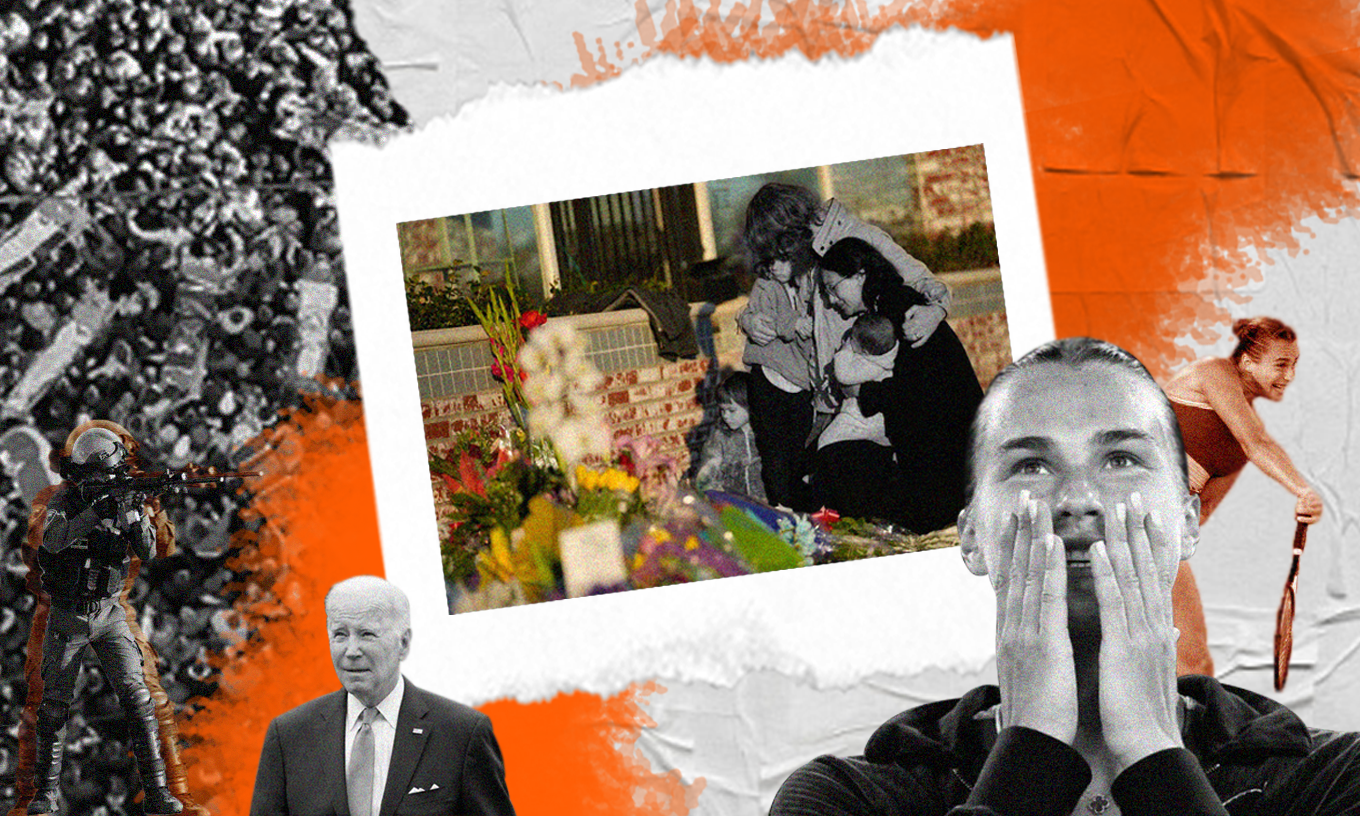The Question
How do you slow memory decline?
Talking Points

- Back-to-back mass shootings rocked California
- More classified documents found in Biden's home
- Microsoft pumped $10bn into OpenAI
- Koran-burning delayed Sweden's NATO bid
- Spotify joined the tech giants swinging the ax
- Israeli raid kills nine in the occupied West Bank
- Power failures afflicted 220m people in Pakistan
- Everyone made fun of Brazil and Argentina's common currency
- Brazilian police named Bruno Pereira and Dom Phillips' murderer
- Arya Sabalenka faces Elena Rybakina at the Australian Open
Deep Dive

When we say "Japanese baby problem" you might imagine the grotesqueries from Akira (1988). But this is about births, deaths, and everything that happens in-between...
Kishida comes up short
This week, Japanese Prime Minister Fumio Kishida spoke on the first day of the new session of the Diet. He rattled off his wish-list for 2023 . Fostering "healthy relations" with Seoul. A plea for private and public interests to work together on decarbonising the economy. Paying for the "sea change" in Japan's security settings (more counter-offensive weapons aimed across the East China Sea). Considering a supplementary budget for the middle of the year. Ho hum. Kishida is not a natural rhetorician. But there was one topic on which the prime minister was visibly exercised: Japan's shrinking population and falling birthrate.
"The number of births dropped below 800,000 last year , according to estimates. Japan is standing on the verge of whether we can continue to function as a society. Focusing attention on policies regarding children and child-rearing is an issue that cannot wait and cannot be postponed."
The otherwise mild-mannered PM forecast societal breakdown. Unnervingly, the facts are on his side. Japan's median age is 49 — two decades older than the global average and second only to Monaco with its leathery millionaires. But Japan is a real country; not a Mediterranean yacht club with a prince. It boasts the world's third-largest economy and is home to 125 million. It should, by rights, be able to sustain itself. It cannot. And has not been able to for a generation. Japan's demographic profile is warped beyond repair. One end is bloated: 29.1% of the country is over the age of 65 (three times the global average). The other is tapering off: a birthrate of 1.3 is well below the requisite 2.1 for replacement.
And so the country is on track to lose a third of its population by 2065.
Children of When?
Kishida's response to the crisis is two-prong. The establishment of a new Children and Families Agency to support parents (or goad prospective parents into doing their "patriotic duty") and the creation of a "child-first social economy"). The PM doubled spending on child-related programmes: cash bonuses for fulfilling our primary biological imperative, and better after-school care options. To any of you nodding along, muttering "impressive" — wrong. The amounts allocated have gone up but the lack of imagination is baked in. What's proposed is a continuation of the same policies that have failed to move the birthrate for decades now . It doesn't matter whether cheques arrive ante- or postpartum: they don't work.
The simple reality is that Japan's cost of living nullifies any advantage the government can offer. It is the third-most-expensive country in the world for raising a child (behind China and South Korea which also happen to have shrinking populations). And despite the awkwardness of using abstracted economics when describing something as monumentally human as child-birth: this is a money thing. The costs associated with higher-education and extra-curricular tuition can bankrupt families — and yet, it is still expected that after child-birth mothers will stay home as primary carers. The tensions between providing education (and opportunity) for women, a deteroriating job outlook, the strait-jacket of patriarchal social mores, and the top-down imperative of economic growth have frayed the fabric of Japan.
Population decline, like climate change, is one of those glacial problems that science (and journalism for that matter) lack the tools to sufficiently explain. Problems suffused with our perception of reality; they may as well be the ambient radiation drone of the universe itself. The only effective vehicle for explanation is art. To that end, everyone should buy tickets to Chie Hayakawa's debut film. Plan 75 (2022) debuted at last year's Cannes Un Certain Regard. It contends with a not-too-distant Japan in which the government grapples with an aged population. The film's solution is government sponsored voluntary euthanasia for those over the age of 75. It is a delicate film about a country that has discovered the outer limit of usefulness, and empathy.
For the cineasts out there: perhaps the answer already lies in Kinji Fukasaku's final film Battle Royale (2000).
Worldlywise


Winners and Losers

📈 US residential gas seller
Someone spun the Culture War Wheel and the arrow landed on 'gas stoves are the final bulwark against communism'. These kitchen appliances have now been elevated alongside God and guns in the ranking of stuff that the Feds can't mess with. The internet is awash with videos of Americans grinning manically next to lit burners as carbon monoxide poisoning slowly sets in. This could be the last great run of the US residential gas industry.
📈 Litterbugs
As much as we hate to admit it, this has been a banner week for the ne'er-do-wells who throw their plastic rubbish on the ground. Some very unhelpful researchers at the Royal Netherlands Institute for Sea Research discovered that the ubiquitous bacterium Rhodoccus ruber absorbs plastic molecules and digests it into CO2 and other less harmful molecules.
📉 FTX's creditors
On Wednesday, lawyers from the spectacularly crook outfit FTX tabled a 115-page list of creditors in the Delaware Chancery Court. It's understandable that unsophisticated mom-and-pop outfits like *checks notes* BlackRock and Google — didn't have the resources or wherewithal to do even half an hour of due diligence into a "magic money box". Embarrassing!
📉 Science
The journal Nature has served notice to the systematic study of the physical universe through observation and repeated experimentation. A recent study revealed a clear decline in breakthrough and disruptive discoveries between 1945 and 2010. Where is the ambition? Too many STEM kids are cooped up inside talking to Hermann Göring chatbots when they should be out there trying to capture dark matter with butterfly nets. Do better, science.
Highlights
The Image

Elena Rybakina, poised to belt the living hell out of this poor tennis ball at the Australian Open. The Kazakhstani is on her way to the Women's Singles finals and we can only hope she wins so the rest of us can marvel at one of the only national flags that is cool and good. Photo supplied by The Independent .
The Quote
"You being here [when I have to] escort them to school and when they come home – is not good. On a human level, you guys know I'm not going to say anything to you. You know that. So please leave my family in peace. And let this all play out. OK?"
– Hilaria Baldwin , shoos away the paparazzi in New York after news broke that her husband, Alec Baldwin, would be charged with involuntary manslaughter. Sure, this isn't a very interesting quote. Not go back and read it aloud in the most-contrived Spanish accent that your sense of propriety will allow . The encounter has gifted us another opportunity to hear the mock-ESL stylings of this native Bostonian. It's amazing what a few years in Mallorca will do.
The Numbers
$2.1bn in unsold hand-towels
- Bed Bath & Beyond received a default notice this week over its failure to meet a prepayment on JP Morgan's slice of a $2.1bn debt pile. The former meme-stock and soon-to-be former homewares retailer is doing the corporate equivalent of turning its pockets inside out, and shrugging. It's a shame. Bed Bath & Beyond went all in on linen pillow covers and loofahs but failed to find a market for its final eponymous line: arcane ontological texts about the afterlife.
80% of the Chinese population has been infected with Covid-19
- That's a... considerable number of people .
The Headlines
"Japan PM aide told off by his 'ashamed' mother for putting hands in pockets on Biden trip" — The Guardian . Good manners are still kicking.
"The Trillion-Dollar Coin Might Be the Least Bad Option"
— The Atlantic . Please for the love of all that is holy: mint the coin.
The Special Mention
A richly-deserved Special Mention in the field of 'Growing Old Gracelessly' goes to Bryan Johnson and his efforts to turn back the clock. This 45-year-old tech centimillionaire has employed a team of 30 doctors and specialists to de-age his body. For a cool $2mn per year Johnson is being prodded, poked, injected, and monitored to attain the body and organs of an 18-year-old. Weird stuff.
The Most-Read Article
'A superfungus could be the next global health threat – so are we ready'
The Best Long Reads
- Businessweek asks if the recession is coming or going
- The Walrus struggles to hold onto pandemic memories
- The Atlantic reports life behind bars on Rikers Island
Thomas Wharton
Senior Editor







